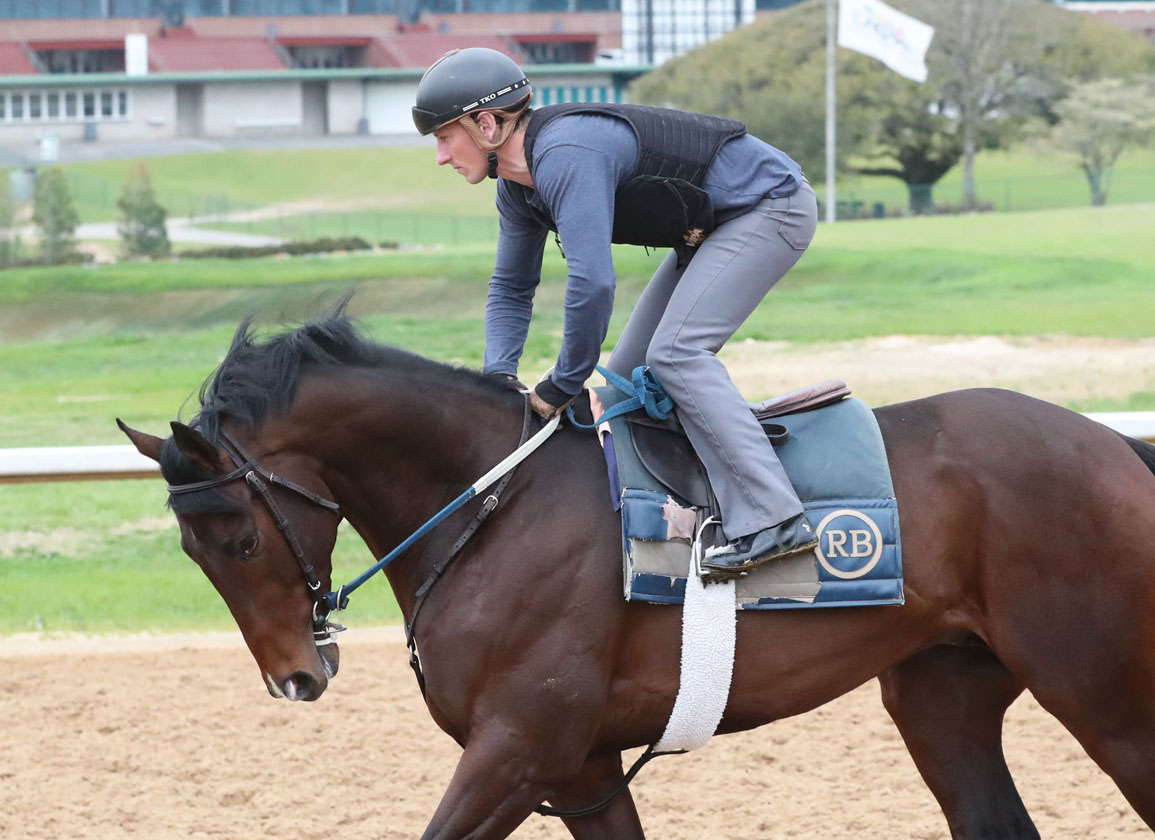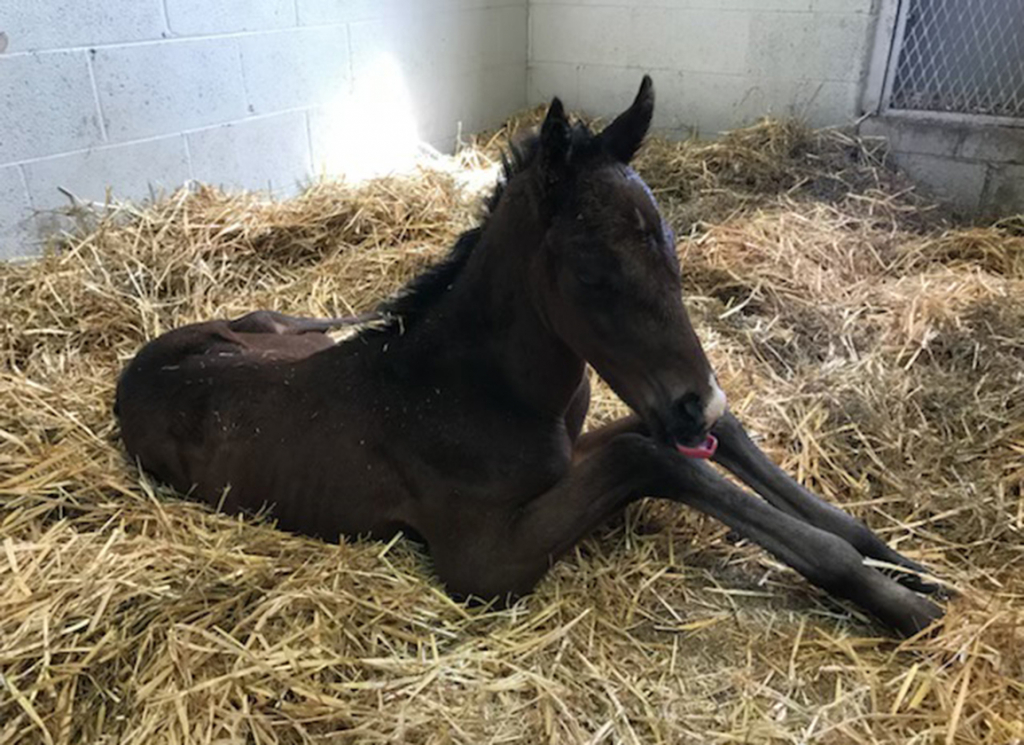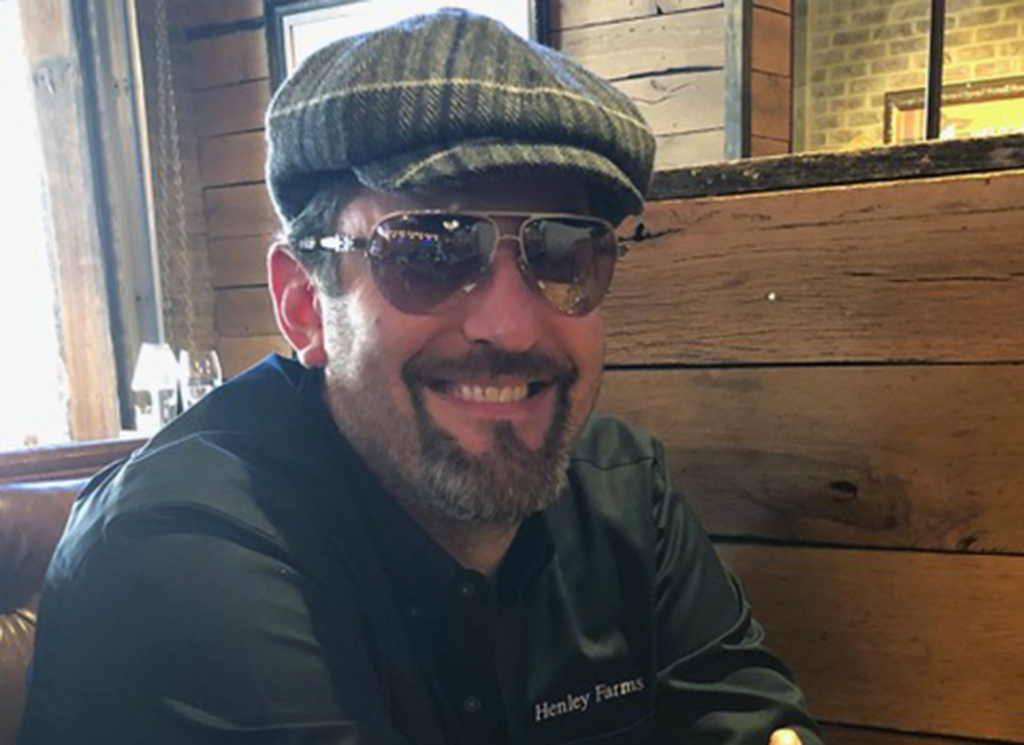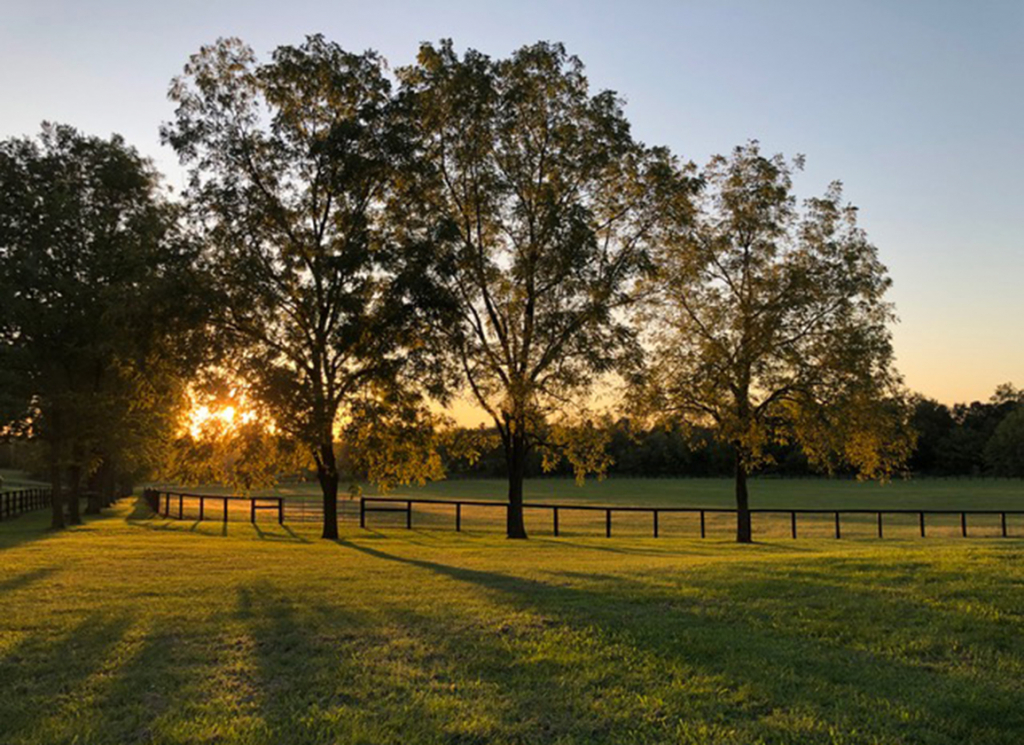By Chris McGrath
Somehow they had got it into their heads that it might be nice to buy “a small, gentleman's farm”, just 10 acres or so, as an eventual retirement project. Jana Barbe's daughters, emulating her own childhood passion, had always enjoyed riding and some of the show horses were kept here in Kentucky. Such a beautiful part of the world, they hired a local broker and did some idle prospecting. Then came the 2008 crash.
“And this business, being built on disposable income, suffered terribly,” Barbe recalls. “Suddenly it felt like every farm was on the market. And our broker called with this place on Newtown Pike near Georgetown. Just a little bigger than we wanted.”
Like, eight times bigger. But they came out and had a look anyway. A little Eden on the Elkhorn Creek. There and then, Barbe's husband announced that their search was over.
They returned to their Chicago home, situated on a 25×125-foot lot, and Barbe summoned all the hard-headed sense that had for six years made her the only woman on the global board of law giant Dentons.
“Roy,” she said, “you're out of your mind. We can't possibly do this. I work like a dog, seven days a week. I'm on the road all the time. Not to mention the fact that we know nothing about farming. You grew up on the northwest side of Chicago. I've never taken care of my own horses. We don't even have a yard. This is a working farm. It comes with a tractor!”
“No,” he said, immovable. “We're going to do this.”
Be in no doubt, there are still days when she lies there at night, watching the monitors from the foaling stalls, asking how did this happen.
“I can never sleep when we're waiting,” she says. “Even though we have someone on duty.”
This week she has been fretting over the overdue delivery–aptly enough, of a More Than Ready foal share–by an 11-year-old daughter of Tiznow, one of eight Thoroughbred mares now residing at Henley Farms. Letchworth's fourth foal is imminent even as her first prepares for the GIII Peter Pan S., at Belmont on Saturday, with prospects of breaking into the elite of his crop. We the People (Constitution) disappointed when fast-tracked to the GI Arkansas Derby, after two sensational scores, but that attempt to shoehorn him into the first Saturday in May was perhaps too much too soon. Either way, as its first graduate, We the People has already sealed the accidental emergence of this boutique Thoroughbred nursery.
But it's a fair question she asks: how did this happen? Raised near Miami, without the affluence for horses of her own, Barbe always found a way to get across a saddle: summer camp, stable work, college riding club. On graduating from law school, when her peers were leasing apartments, she devoted her first paychecks to leasing a jumper. She stabled him in downtown Chicago, on Schiller and Orleans, alongside the carriage horses.
By the time the Barbes bought Henley Farms, however, horses had long been marginal to her stellar career and the raising of a family. The first thing they did, then, was track down all the show horses that had maintained an equine connection over those years. “They looked after you and the girls all that time,” said Roy. “Now it's our turn to look after them.”
That's why you'll find a 31-year-old Welsh Pony next to the dam of We the People. But the Bluegrass soon began its cultural osmosis. Their first farm manager's dad was the late Marvin Little, Jr., breeder of Hansel (Woodman), who invited them to take a piece in a broodmare.
“And that's how it starts, right?” says Barbe. “You dip a toe in, then a whole leg. And one day you wake up and say, 'You know, we could do this. We have all this land, we have paddocks, stalls, everything we'd need.' So that's how it began. But those first years, it should have been a reality TV show. Every stupid horse mistake you could make, we made. Amateur with a capital 'A'.”
But every trial, every error, became a lesson learned. Four years on, they confidently perform their own foaling. And the two sides of Barbe's life not only dovetail but nourish each other. Long before Covid, she was adapting to remote working.
“It soon became apparent that clients were more focused on whether the work got done, and its quality, as opposed to where it might have been done,” she says. “Lexington has airports. I can travel wherever. I'm on a public company board [Invitation Homes, Inc.], a private company board [The Boler Company], I'm a senior advisor for Blackstone. And they all get it.
“Mine is a life of extremes. Yesterday one of the warmbloods had a gas colic. It wasn't severe, but he loves attention so I groomed him for an hour and a half, because it kept him standing. And when I came in and looked in the mirror, I mean, I was wearing his winter coat. I was disgusting. And I did think that if I had to get on a Zoom call now, and explain this! But they've all accepted that people have passions in life, that can run the gamut, and it's OK.”
And then what a treat to break off: nice clean office, fancy hotels, not to mention intellectual stimulation.
“The business world gives you at least an illusion of control,” Barbe reflects. “I'm a control freak by nature, and it gives you that feeling: 'OK, I'm in charge, we're going to make a decision, we're going to weigh in on this. I have authority, a degree of autonomy.' Then you come here, and some colt is dragging me down the road, and there's no control. None. You can be derailed by the weather. And these horses, they all have minds of their own. Like Letchworth's Audible [yearling]. From a very young age, he found it necessary to jump out of the paddock. Doesn't go anywhere, doesn't actually want to leave his herd. But he can clear a four-foot fence, uphill, without a scratch. So very athletic, right? But I have no control.”
Obviously they try to be as proactive as possible in sales prep.
“But so much of farming is about reacting,” Barbe accepts. “And being tuned in. And accepting that what will be, will be. So yes, it keeps everything fresh. During Covid, it was the horses that kept me sane: the bonds, the empathy, were amazing. When I go away for business, I get to be a different person. But then I come back here, and I prize it: I'm in heaven on earth.”
With that inquiring mind, Barbe has relished learning pedigrees. Indeed, while stressing her gratitude to advisors at Taylor Made, it was she who found Letchworth at the 2019 January Sale: unraced, but out of Grade I winner Harmony Lodge (Hennessy).
“The inner nerd takes over, reads every page of every book,” she says with a laugh. “It was one of our first sales, she was pregnant to Constitution, who at that point was an unproven 'bubble' horse. We knew that bloodlines plus black type would be out of our range, so we had to choose–and we went with bloodlines. So I dragged Roy to see her, and she's big and beautiful. At first Taylor Made said, 'Hmm, don't know, what are you going to do with the baby?' And we said we weren't buying for the baby, so they went and looked at the mare and said actually she's really nice.”
And, in the event, the baby turned out to be an unexpected bonus. Constitution's first juveniles flew, and this colt–from his third crop–proved formidable in every way. Barbe shares footage of him bucking and careering round a paddock when barely a week old.
“He was strong-willed and aggressive,” she recalls. “Like, if you turned your back, he playfully bit you. He literally came out bucking. He'd cow kick. He was high-spirited, independent, fearless. The mare's Audible colt, he's massive too, but you can walk into the box and pet him. You couldn't have done that with We the People.”
Slipstreaming the momentum of his sire, the feisty weanling immediately recouped the $40,000 paid for his mother when making $110,000 at Keeneland November from Machmer Hall. (He exactly doubled his value in the same ring the following September, albeit a second pinhook cycle only inched him up.) And he may yet perform further services to the page, plainly having far more ability than he showed in his first big test.
“He's so fast, his times were insane,” Barbe says. “But he'd never been in a crowd before, he got stuck in there and didn't like it one bit. The trainer [Rodolphe Brisset] in his interview said that he's not an easy horse, and he wasn't from birth. The personality comes through pretty quickly. My hope would be that he learned, that he can digest and process the experience and bring that speed to bear.”
With his upgrade, We the People's half-brother by Always Dreaming advanced his $65,000 yearling cost (lower than Barbe expected, evidently due to a corrected OCD) to $220,000 from SBM Training & Sales at OBS April. (“The same athleticism,” says Barbe. “Only in a more manageable brain and package.”) But whatever happens next, We the People has already taken the couple who raised him somewhere they hadn't really anticipated in starting their Thoroughbred adventure.
“I was a little ambivalent about the racing,” Barbe admits. “I love animals, and in many ways racing is problematic in how it treats horses. It's an industry in transition, and appropriately so. It does need to clean up its own house. But I do now understand what I didn't fully appreciate before: the way that these Thoroughbreds are born to run. Our babies in the back field, they gallop up the hill, they gallop down the hill, nobody's forcing them. And then We the People happened. Watching this horse we bred, I was screaming like a lunatic at the television. It was like, 'OK, now I get this. This was a baby I played with here. This is quite different.'”
In the meantime, she had been heartened that her new community not only embraced these city novices but shared their values; that so many walk the walk on welfare. But something else also happened, the day Letchworth's bronco baby made his debut. All her competitive spirit was suddenly in play. And, as Barbe acknowledges, you don't carve out a career like hers without being extremely competitive.
“It's never easy when you're the only woman in the room,” she says. “But in life I generally find it helpful to give people the benefit of the doubt, to ascribe good motives. Life's too short to go into the room expecting trouble or rejection or condescension. And anyway I'm not easily dissuaded. It's like riding: you fall, you pick yourself up, you get back on.”
She works hard to be not just a model for aspiring young women, but also an advocate and mentor. “Choose your battles, with an eye on the prize,” she urges those who seek her counsel. “Not every pass is a touchdown. You can get a first down by three relatively short running plays. Tortoise, not the hare. Don't be derailed by every obstacle, every potential argument. Don't allow your sense of security and self-worth and identity to be shaken by others. External validation is great, when you get it, but it in the end it's artificial. What has to drive you is internal.”
Easier said than done, she grants. “There'll be lots of days with lots of tears,” she says. “You know that 'glass ceiling' people talk about? I used to come home from work and my husband would be picking shards out of my head. When I graduated from law school, in 1987, the percentage of women equity partners at big law firms was between 15% and 18%, and the goal was 20%. And the goal today? Still 20%.
“But the more deliberate and strategic I became, the more I understood my power, and married that power to my authenticity, the more effective and accepted I became. But you shouldn't have to wait until you've turned 50 to wake up one morning and say, 'OK, so maybe if I hold my breath a little here, am a bit more measured there…' We're demanding a level of grit and resilience that is unfair. Because the work is hard enough.”
So how has she found the Turf, still so dominated by males?
“It is a very conservative environment, and needs a lot more diversity of all kinds for sure,” she accepts. “But the only way we're going to achieve that is one person at a time, one foot in front of the other, and being really smart in how we go about it. We will get there. Because we have to. In the end the sport will become integrated because it can't not.”
That's also why she believes other, systemic issues will also be tackled: because continued obstruction of reform will simply kill the industry. “In the end, everybody engaged in the sport will have a choice to make,” she says. “Change is hard, I get it. But the sport will have to evolve, or it won't survive. If people think that's not coming, they haven't been paying attention.”
Not that the Barbes intend turning the game on its head. Certainly their program is conforming to established market prejudices, using new sires and fashionable crosses. But they have shown imagination, too, for instance in acquiring (with Taylor Made's help) a 2-year-old Ghostzapper filly for just $10,000. She wasn't going to stand training but conformation and pedigree nonetheless made her eligible to breed.
“So we put her in the field and she was raised by two old hunter geldings,” she says. “And her first baby is to die for. So we've tried to be super strategic in our shopping, and super nimble.”
Barbe and her husband are heartened by their reception from a community that might normally profile them only as patrons, not as rivals or colleagues.
“Lots of people have told us it's great to have new blood in the sport,” she says. “And I do feel like we do have a place here; that our voice as a new entry matters, and can join others to advance the sport.”
Recently they hosted an organisation of young corporate highfliers at Henley Farms, eager to learn more about opportunities in Kentucky and the horse world. More than one took them aside with the same awed message. “Look what you've done here,” they said. “You've made your life the way you want it. How many people would take on that risk?”
“I married a man who knew nothing about horses, and he embraced the dream,” Barbe says. “I got really lucky there. And I feel like we're so privileged to be here, to have the chance to pursue dreams. I mean, my dream wasn't horseracing. It was living with my horses. But to have found a life that revolves around them, to have been able to make that happen? It's like everything else, really. One foot in front of another, and chase the dream.”
Not a subscriber? Click here to sign up for the daily PDF or alerts.











